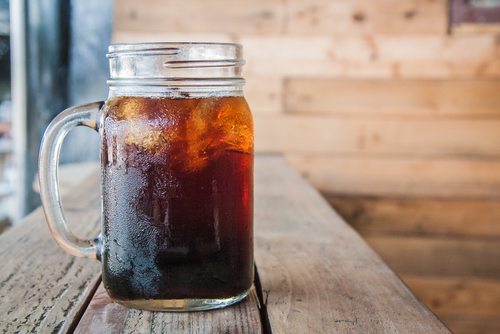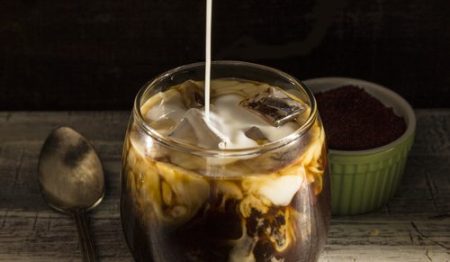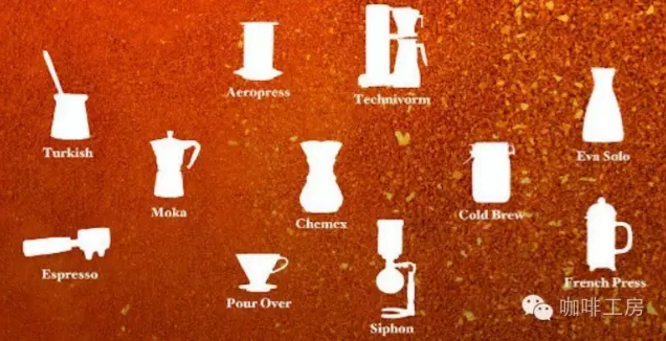do away with all fetishes and superstitions! Cold extract coffee has a high caffeine content. In fact, the truth is that...

For professional baristas, please follow the coffee workshop (Wechat official account cafe_style)
Many people have long misunderstood coffee and its caffeine content. For example, many people will think that espresso coffee has the most caffeine (but if you look at the content of the drink, it's not); deep-roasted coffee will contain more caffeine than light-roasted coffee (not really, all roasted coffee has the same amount of caffeine in the end). In addition, many people think that cold extract coffee (cold brew coffee) will contain more caffeine. So, is that actually the case?
One media company, Huffington Post, has made a special study on this topic:
Well, let's start with the conclusion. It's a long story (the editor has fainted). But if you want to see the complete exposition and conclusion, let's move on.
The caffeine content in coffee is very variable.
The first thing you need to know is that the caffeine content in coffee is very easy to change. Energy drinks can well list the caffeine content, but the caffeine content in coffee drinks can vary greatly. For example, a cup of Arabica coffee may contain 84-580 milligrams of caffeine. Even if each coffee chain brews coffee with the same name, the caffeine content may be different.

Among them, there are many variables: coffee type, grinding degree, brewing time, coffee bean mixing ratio and so on will have an impact on caffeine content.
Despite these variables, cold-extracted coffee generally has less caffeine than regular coffee.

Caffeine is soluble in water, and the hotter the water used to make coffee, the more caffeine will be dissolved. This fact also explains that hot-extracted coffee has more caffeine than cold-extracted coffee (because cold-extracted coffee is made in cold water).
The solubility of caffeine is mainly determined by temperature. If the ratio of coffee beans to water is constant, that cold coffee will have less caffeine than hot coffee. But here's the problem: cold-extracted coffee generally has a bean-to-water ratio of 2 to 2.5 times that of regular coffee, which means that cold-extracted coffee is theoretically more caffeinated than coffee made by traditional processes and proportions. However, cold-extracted coffee generally needs milk or water to dilute, so the concentration of caffeine is diluted.

Starbucks' cold coffee is a good example. A 16-ounce cup of Starbucks cold coffee is reported to have 200 milligrams of caffeine, but a 16-ounce cup of regular coffee also has about 260-360 milligrams of caffeine, depending on which beans you choose.
If you talk so much, what effect does it have on people who like cold coffee?

You can rest assured that you can drink it-you don't have to worry about the side effects of cold extract coffee, such as excessive caffeine, heart palpitations and so on. The caffeine content of a cup of cold coffee of the same size is not much different from that of hot coffee. Drink it.
Important Notice :
前街咖啡 FrontStreet Coffee has moved to new addredd:
FrontStreet Coffee Address: 315,Donghua East Road,GuangZhou
Tel:020 38364473
- Prev

popular science| How do you taste all that stuff in coffee? About the cup test.
Professional barista communication Please pay attention to coffee workshop (Weixin Official Accounts cafe_style ) Although you often see the flavor description of coffee beans, there are still people who are confused about what these tastes are. So let's talk about those things about cup test (cup taste) coffee today. We should distinguish the flavor, body, acidity and wet aroma of coffee.
- Next

Drinking coffee will also be "drunk" two types of physique people are not suitable to drink!
Professional barista communication please pay attention to the coffee workshop (Wechat official account cafe_style) can you get drunk after drinking coffee? In the concept of traditional Chinese medicine, coffee is an irritating drink, which is easy to cause damp-heat constitution. Lai Ruixin, a traditional Chinese medicine practitioner, pointed out that some people feel uncomfortable when they drink coffee, also known as coffee drunkenness. In fact, it is coffee poisoning or caffeine sensitivity. It is a physical problem that is easy to be sensitive to coffee. Spleen and stomach are damp and hot.
Related
- Beginners will see the "Coffee pull flower" guide!
- What is the difference between ice blog purified milk and ordinary milk coffee?
- Why is the Philippines the largest producer of crops in Liberia?
- For coffee extraction, should the fine powder be retained?
- How does extracted espresso fill pressed powder? How much strength does it take to press the powder?
- How to make jasmine cold extract coffee? Is the jasmine + latte good?
- Will this little toy really make the coffee taste better? How does Lily Drip affect coffee extraction?
- Will the action of slapping the filter cup also affect coffee extraction?
- What's the difference between powder-to-water ratio and powder-to-liquid ratio?
- What is the Ethiopian local species? What does it have to do with Heirloom native species?

